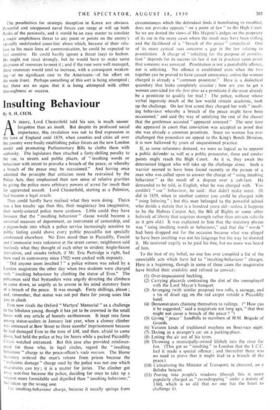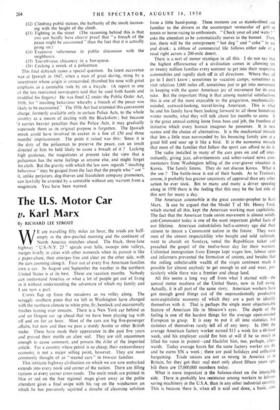Insulting Behaviour
By R. H. CECIL N injury, Lord Chesterfield told his son, is much sooner forgotten than an insult. But despite its profound social importance, this revelation was not to find expression in the laws of England until 1839, when counties and cities all over the country were busily establishing police forces on the new London model and promoting Parliamentary Bills to clothe them with authority. The legislators then attached a forty-shilling penalty to the use, in streets and public places, of " insulting words or behaviour with intent to provoke a breach of the peace, or whereby a breach of the peace may be occasioned." And having once admitted the principle that criticism must be restrained by the Police Acts, they emphasised their new sense of relative gravities by giving the police more arbitrary powers of arrest for insult than for aggravated assault. Lord Chesterfield, starting as a Polonius, had become a legal oracle.
They could hardly have realised what they were doing. Theirs was a less touchy age than this, their magistracy less imaginative, their newly-created police more cautious. Little could they have foreseen that the " insulting behaviour " clause would become a universal measure of deportment, an instrument of censorship, and a pigeon-hole into which a police service increasingly sensitive to public feeling could shove every public peccadillo not specially condemned elsewhere. No Eros stood `then in Piccadilly, Fascist and Communist were-unknown at the street corner, neighbours said fearlessly what they thought of each other in strident Anglo-Saxon derivatives, and snooks (which, if Mr. Eric Partridge is right, had been used in controversy since 1702) were cocked with impunity.
" Did anyone seem insulted ? " a police witness was asked by a London magistrate the other day when two students were charged with " insulting behaviour by climbing the statue of Eros." The policeman said that bystanders were angrily directing the climbers to come down, so angrily as to arouse in his mind statutory fears of a breach of the peace. It was enough. Forty shillings, please ; and, remember, that statue was not put there for young asses like you to climb.
Eros now rivals the Oxford " Martyrs' Memorial " as a challenge to the bibulous young, though it has yet to be crowned in the small hours with any article of homely earthenware. It leapt into fame among statue-scalers in January last year, when a clumsy climber was sentenced at Bow Street to three months' imprisonment because he had damaged Eros to the tune of £48, and then, afraid to come down, had held the police at bay for hours while a packed Piccadilly Circus watched entranced. But this case also provided reinforce- ment for those who, in legal circles, regard the " insulting behaviour " charge as the peace-officer's vade mecum. The Home Secretary ordered the man's release from prison because the " malicious damage " charge used by the police was not one which magistrates can try ; it is a matter for juries. The climber got away scot-free because the police, deciding for once to take up a weapon more formidable and dignified than " insulting behaviour," had taken up the wrong one. I he insulting-behaviour charge, because it usually springs from circumstances which the defendant finds it humiliating to recollect, does not provoke appeals " on a point of law " to the High Court. So we are denied the views of His Majesty's judges on the propriety of its use in the many cases where the insult may have been trilling and the likelihood of a " breach of the peace " conjectural. One of its more cynical uses concerns a gap in the law relating to prostitution. A charge of " soliciting for the purpose of prostitu- tion " depends for its success (in law if not in practice) upon proof that someone was annoyed. Prostitution is not a punishable offence, nor is soliciting. No offence is established even when the two together can be proved to have caused annoyance, unless the woman charged is already a " common prostitute." Here is a dialectical quandary that looks completely circular ; how are you to get a woman convicted for the first time as a prostitute if she must already be a prostitute to qualify for trial ? The police, without whose verbal ingenuity much of the law would remain academic, took up the challenge. On her first arrest they charged her with " insult- ing behaviour whereby a breach of the peace might have been occasioned," and said (by way of satisfying the rest of the clause) that the gentleman accosted " appeared annoyed." The next time she appeared in court that conviction was accepted as proof that she was already a common prostitute. Since no woman has ever challenged this procedure on appeal to the King's Bench Division, it is now hallowed by years of unquestioned practice.
If, as some reformers demand, we were so logical as to appoint a public defender as well as a public prosecutor, these and similar points might reach the High Court. As it is, they await the determined litigant who will take up the challenge alone. Such a warrior seemed to have been found recently in the person of a man who was called upon to answer the charge of " using insulting behaviour " as the result of a dispute over a cab-fare. He demanded to be told, in English, what he was charged with. You couldn't " use " behaviour, he said: that didn't make sense. (It did in 1839, when in another context you could be charged with " using loitering " ; but this man belonged to the powerful school who deride a statute that is a hundred years old—unless it happens to be the Habeas Corpus Act, the Bill of Rights or some other bulwark of liberty that acquires strength rather than attracts ridicule as it gets old.) It was explained to him that the statutory phrase was " using insulting words or behaviour," and that the " words " had been dropped out for the occasion because what was alleged to have been insulting was not his language but the way he shouted it. He muttered angrily as he paid his fine, but no more was heard of him.
To the best of my belief, no one has ever compiled a list of the unsociable acts which have led to " insulting-behaviour " charges. Here is a beginning, though in some of these cases the magistrates have bridled their credulity and refused to convict: Over-impassioned heckling.
Carrying placards contrasting the diet of the unemployed with the Lord Mayor's banquet.
Arranging (with similar purpose) two rolls, a sausage, and a tin of dried egg on the red carpet outside a Piccadilly hotel.
(4) Demonstrators chaining themselves to railings. (" How can it be suggested," said a magistrate not long ago, " that that might not cause a breach of the peace ? ") (5) Giving " peace handbills to members of H.M. Brigade of Guards.
(6) Various kinds of traditional mayhem on Boat-race night.
(7) Dozing in a stranger's car on a parking-place.
(8) Letting the air out of his tyres.
(9) Throwing a municipally-owned lifebelt into the river for fun. (This got so " insulting " in London that the L.C.C. had it made a special offence ; and thereafter there was no need to prove that it might lead to a breach of the peace.) (10) Caricaturing the Minister of Transport, in charcoal, on a Belisha beacon.
(11) Peering into people's windows (though this is more popularly charged as " eavesdropping " under a statute of 1360, which is so old that no one has the heart to challenge it).
(12) Climbing publiC statues, the barbarity of the insult increas- ing with the height of the climb. (13) Fighting in the street (The reasoning behind this is that you can hardly have clearer proof that " a breach of the peace might be occasioned " than the fact that it is actually going on.) (14) Excessive vehemence in public discussion with the neighbours.
(15) Too-obvious chicanery in a bus-queue.
(16) Cocking a snook at a policeman.
This final debauch raises a special question. Its latest occurence was at Ipswich in 1947, when a man of great daring, stung by a resentment whose origin is unrecorded, thumbed his nose with great emphasis as a constable rode by on a bicycle. (A report in one of the less restrained newspapers said that he used both hands and twiddled his fingers.) He was fined £2 under the Public Order Act, 1936, for " insulting behaviour whereby a breach of the peace was likely to be occasioned." The 1936 Act had extended this convenient charge. formerly available only in certain Police Acts, to the whole country as a means of dealing with the Blackshirts ; but because `it carries heavier penalties than the Police Acts, it may gradually supersede them as its original purpose is forgotten. The Ipswich snook could have involved its cocker in a fine of £50 and three months' imprisonment. The point it raised was this: Since it is the duty of the policeman to preserve the peace, can an insult directed at him be held likely to cause a breach of it ? Lacking high guidance, the magistrates at present take the view that a policeman has the same feelings as anyone else, and might forget his cloth. But the gravity with which the law now regards " insulting behaviour " may be gauged from the fact that the people who " use " it, unlike perjurors, dog-thieves and fraudulent company promoters, can lawfully be arrested by a constable without any warrant from a magistrate. You have been warned.



































 Previous page
Previous page